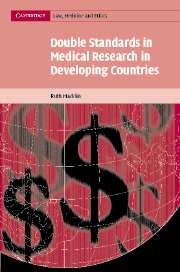Book contents
- Frontmatter
- Contents
- Acknowledgments
- 1 International research contested: controversies and debates
- 2 Maintaining ethical standards in research
- 3 Striving for justice in research
- 4 Avoiding exploitation
- 5 Providing safeguards: informed consent and review of research
- 6 Making drugs affordable
- 7 Respecting, protecting, and fulfilling human rights
- 8 Striving for a single standard
- Index
4 - Avoiding exploitation
Published online by Cambridge University Press: 12 November 2009
- Frontmatter
- Contents
- Acknowledgments
- 1 International research contested: controversies and debates
- 2 Maintaining ethical standards in research
- 3 Striving for justice in research
- 4 Avoiding exploitation
- 5 Providing safeguards: informed consent and review of research
- 6 Making drugs affordable
- 7 Respecting, protecting, and fulfilling human rights
- 8 Striving for a single standard
- Index
Summary
It may be easier to recognize exploitation when we see it than it is to define the concept. A case in point is a clinical trial sponsored by Pfizer in 1996 in Nigeria during an epidemic of meningitis in children. The company was testing trovafloxacin (under the trade name, Trovan), a drug that had not yet been approved by the FDA for use in the United States. Critics charged that it was unethical to use the circumstances of an epidemic to test a new drug. A meningitis specialist from the US who co-authored industry guidelines for conducting meningitis experiments expressed surprise that Pfizer embarked on this experiment since the guidelines did not envision tests conducted under such conditions – “testing an antibiotic amid a terrible epidemic in a squalid, short-staffed medical camp lacking basic diagnostic equipment.” The meningitis specialist was reported as saying: “I just wouldn't do a study that way myself. I know they wanted to get the data. They wanted to go fast. They wanted to move ahead. I'm not sure they made a smart decision.”
Unlike some other examples of international research that have been criticized as unethical, the Nigerian meningitis experiments actually resulted in significant harm to participants. Eleven children who received the experimental drug died, and 200 others became deaf, blind, or lame. A frequent allegation in studies conducted in countries that have few or no mechanisms for proper review of research proposals, or in which the population is illiterate or otherwise vulnerable, is the partial or complete absence of informed consent to participate in research.
- Type
- Chapter
- Information
- Double Standards in Medical Research in Developing Countries , pp. 99 - 130Publisher: Cambridge University PressPrint publication year: 2004
- 1
- Cited by

